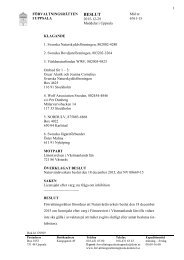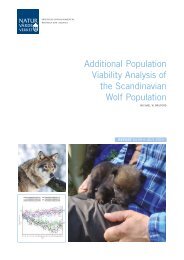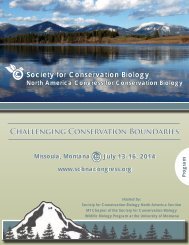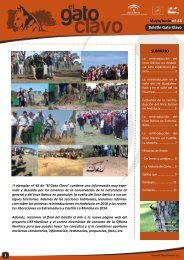1oC3Dbk
1oC3Dbk
1oC3Dbk
Create successful ePaper yourself
Turn your PDF publications into a flip-book with our unique Google optimized e-Paper software.
and establishing strong and effective relationships among<br />
tapir conservationists to stimulate communication and<br />
cooperation.<br />
In 2013, the TSG continued to make steady progress in<br />
developing National Action Plans for Tapirs in each tapir range<br />
country in South and Central America and Southeast Asia.<br />
TSG country coordinators and committees are working<br />
tirelessly towards implementing the priority actions and goals<br />
developed for each plan. The TSG is well on its way to the<br />
implementation of the TSG Strategic Plan 2012–2014. A new<br />
three-year Strategic Plan will be developed during the Sixth<br />
International Tapir Symposium to be held in Brazil in November<br />
2014. The TSG has completely revamped the TSG<br />
Conservation Fund (TSGCF); increasing its donor basis and<br />
running a successful 2013 funding cycle. Five proposals were<br />
selected for funding, including projects in Belize, Colombia,<br />
Ecuador, Myanmar and Nicaragua. The TSG made significant<br />
progress on the review and update of several of its<br />
publications including the TSG Veterinary Manual, TSG<br />
Protocols for Genetic Studies and TSG Guidelines for<br />
Reintroductions and Translocations. Tapirs continued to have<br />
significant exposure in the media and the tapir conservation<br />
cause has received a lot of attention from the general public,<br />
particularly in Brazil.<br />
The TSG would like to acknowledge the generous support<br />
of the Association of Zoos and Aquariums (AZA) Tapir Taxon<br />
Advisory Group (TAG), Copenhagen Zoo, European<br />
Association of Zoos and Aquariums (EAZA) Tapir Taxon<br />
Advisory Group (TAG), Houston Zoo, and hundreds of other<br />
zoos worldwide!<br />
Patrícia Medici<br />
Chair, Tapir Specialist Group<br />
Task Force on Systemic Pesticides (TFSP)<br />
In recognition of the fact that the rapidly growing global use of<br />
highly persistent systemic pesticides, unprecedentedly toxic to<br />
Bumblebee. © D.A.Noome<br />
invertebrates (including pollinators), poses a major threat to<br />
biodiversity and ecosystem services, a number of independent<br />
scientists established a Task Force on Systemic Pesticides in<br />
2009. This Task Force now resides under the IUCN Species<br />
Survival (SSC) and Ecosystem Management (CEM)<br />
Commissions. At present, the group consists of 49 experts<br />
and scientists from 15 countries, in addition to a number of<br />
correspondents in other countries. Dr.Maarten Bijleveld van<br />
Lexmond, of Neuchâtel, Switzerland, former Executive Officer<br />
of the IUCN Commission on Ecology, has been asked to be its<br />
Chairman, while Dr J.P. van der Sluijs of the University of<br />
Utrecht, Netherlands, agreed to become its Science<br />
Coordinator.<br />
The Task Force aims to describe clearly the ever-increasing<br />
risks to ecosystems and biodiversity; to demonstrate the<br />
imbalance in present knowledge; to determine the<br />
consequences for public health; to look for alternatives and to<br />
inform the public at large. In order to achieve the goals of the<br />
this Task Force, a strategy with its objectives and phases of<br />
execution was developed through working meetings in Paris,<br />
France (2010), Bath, UK (2011), Cambridge, UK (2012), Padua,<br />
Italy (2012), Louvain-la-Neuve, Belgium (2013) and Tokyo,<br />
Japan (2013), with financial support of twelve European<br />
organizations and foundations in Germany, Japan and The<br />
Netherlands. The Task Force reviews its progress at biannual<br />
meetings and has entered into a formal partnership with<br />
Utrecht University, Netherlands.<br />
This year, two scientific papers were published concerning<br />
the impact of systemic pesticides on macro-invertebrates in<br />
surface water, as well as the impact on bees and pollinator<br />
ecosystem services.<br />
In Asia, a public symposium was organized in Tokyo on<br />
2–3 September 2012, which involved leading Japanese<br />
experts and NGO’s, in collaboration with the Act Beyond Trust<br />
and Japan Endocrine-Disruptor Preventive Action, JEPA. This<br />
was followed by symposia on “Human Health Effects of Neonicotinoid<br />
Pesticides” and on “Impacts on Honey Bees, Aquatic<br />
Ecosystems and Rice Cultivation” in Tokyo, 9–11 June 2013.<br />
The Task Force’s 7th international working meeting took<br />
place in Legnaro, Italy on 4–8 November 2013, incorporating a<br />
Phytoiatric Forum organized by Veneto Agricoltura. During the<br />
forum, the Task Force examined the final version of its<br />
extensive synthesis report on the ecological risks of systemic<br />
pesticides.<br />
Maarten Bijleveld van Lexmond<br />
Chair, Task Force on Systemic Pesticides<br />
Temperate South American Plants Specialist<br />
Group<br />
There are more than 19,800 species of plants under the<br />
scope of the Temperate South American Plants Specialist<br />
Group; evaluating such a large number of species is an<br />
extraordinary challenge. Considering that the SSC Strategic<br />
Plan indicates that the assessment of plants needs to be<br />
substantially enlarged to represent adequately the diversity<br />
of life, we are focusing our efforts on endemic species, with<br />
the objective to assess at least 1,000 endemic species in<br />
the period 2013–2016. Our key strategy is to involve local<br />
provincial governments in financing assessment workshops;<br />
such meetings provide excellent opportunities to interact with<br />
officials of local administrations in charge of conservation<br />
Specialist Groups, Task Forces and Red List Authorities<br />
87






